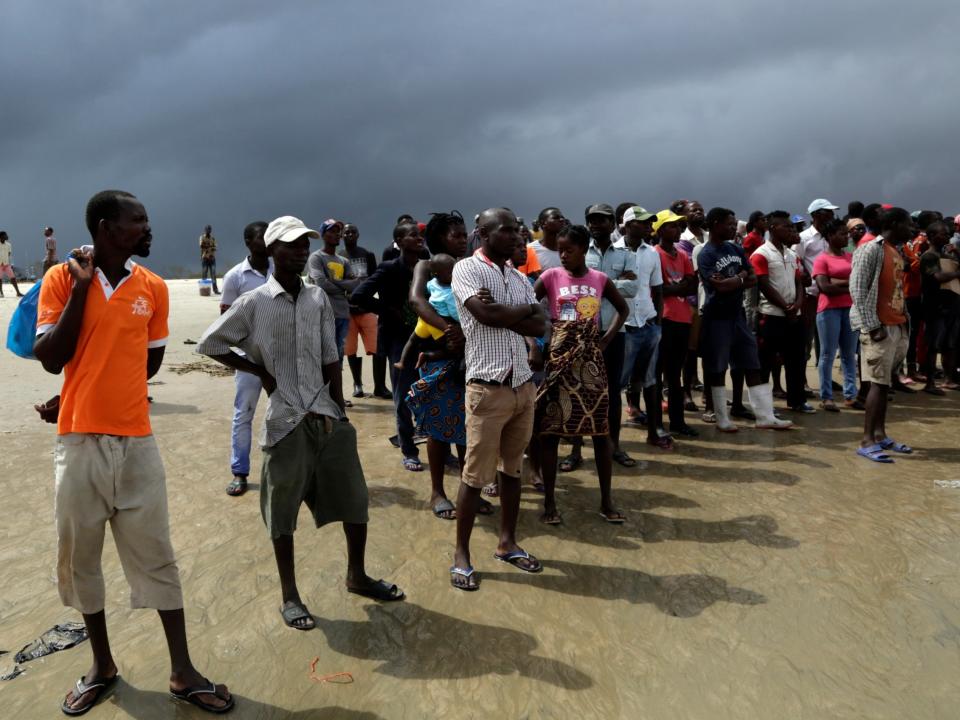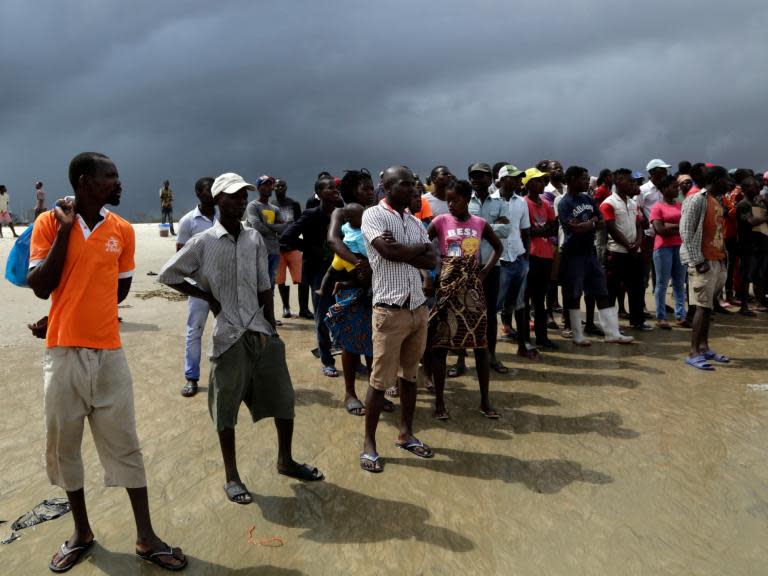Cyclone Idai: families desperately search for loved ones in aftermath of disaster
She struggles home with food, her small daughter and the proof she is still alive.
Veronica Fatia huddles on a wooden boat leaving the cyclone-shattered city of Beira for what is now the unknown: the flooded town of Buzi, which for a week people have been fleeing with little but their clothes.
The fishermen’s boats ferry the displaced daily to Beira, sometimes scores at once. But Fatia is going against the tide, up waters that recently carried corpses to the sea. More than a week after Cyclone Idai roared in, the muddy flood waters are still pouring off the river banks, draining what aid workers have called an inland ocean.
After the three-hour boat journey, carrying bags of rice and her two-year-old daughter, Fatia steps carefully out of the vessel and walks into the remains of Buzi, looking for her mother, hoping she is still alive.
She passes the Jesus Saves Bank, past the three-storey building where on the rooftop residents cluster in search of signal for their mobile phones. She passes the people now living in the open along the sandy main road, cooking, mending, and a young boy reading a textbook.
Her mother might be at the school, Fatia decides. A cry goes up as she approaches it and people come running.
“Mama!” She is there. They embrace on a concrete walkway now littered with cooking fires and tiny children, one nodding off beside a pile of still-warm ashes.
“My home is gone, but I’m also happy because I can see my family,” Fatia says.
Her mother, Maria Antonio, says she last saw Fatia the Tuesday before the storm. “I didn’t know anything about her,” she says. “I’m very happy to see her.”
But the fate of her other daughter, in the seaport town of Quelimane, remains unknown.
It is a common heartbreak for thousands of families in central Mozambique, who have no way to learn about missing loved ones as destroyed communications networks struggle to return. People are desperately searching for family members separated by the flooding, destruction and death brought to the area more than a week ago by Cyclone Idai. Some will not be as lucky as Fatia.
The fishing boats between Buzi and Beira are now a lifeline, braving spattering rain, rolling waves and still the punching stench of death. Near Buzi, a dog’s carcass hangs from the branches of a tree.
Cut off from the world, people can easily panic. One member of the Mozambican Red Cross, Assane Paul, tries to calm a knot of people who had heard a rumour that another cyclone was on its way.
“If you don’t answer well, we won’t eat!” the people call out, as he speaks to the Associated Press.
Other residents of Buzi try to adapt however they can, from the Bible reader on the rooftop blaming the cyclone on people’s sins to the man walking down the road in soaking wet trousers. They are the only clothes he has left, he explains.
Many people are still on the move. Dozens wait at Buzi’s small pier where the fishermen’s boats pull up, bags of belongings at their feet and concern on their faces. Or they simply watch for news.
The other end of the journey is the beach in Beira. Small children and barefoot women are carried off on a fishing boat and gathered together by aid workers in spitting rain. Some look lost. Few carry much. One small girl stands alone, hugging herself, her eyes wide and pleading.
“I hid in the mosque,” says a 12-year-old boy, Ramadan Gulam. “I was there for a week.” He had come from Buzi with nothing but a bag of clothes and his brothers. “My father said to go because the floods would come again... I don’t know what to do now.”
Christina Machado arrives with her two children and a bandage on her ankle. It was cut by a tin roof during the cyclone, she says. It was treated just yesterday.
“I’m looking for my husband,” she says. He had been working in Beira for two months. She doesn’t know where she will be taken next.
Francisco Mambonda spent about a week on a rooftop with nothing to eat. He and his wife and sons drank dirty water to survive.
Barefoot, shivering and in tattered shorts, he adds another plea to the growing chorus, saying: “I don’t know what to do now.”
Emergency responders still have some hope.
As night falls and one wooden boat from Buzi approaches the flickering, generator-lit Beira skyline, another passes in the dusk. It carries soldiers to their duties. Some raise their guns and cheer.
Associated Press

 Yahoo News
Yahoo News 

